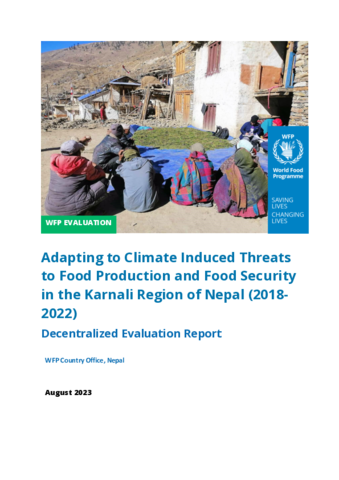
The evaluation was commissioned to a) assess the project's performance and intended and unintended results; b) identify best practices and lessons learned; and c) review the implementation to generate recommendations that will inform future project design and was intended for both accountability and learning purposes.
It focused on assessing the relevance, effectiveness, efficiency, impact, sustainability, coherence, impact and Gender Equality and Empowerment of Women (GEEW). The evaluation covered climate-induced threats to food production and security.
Overarching evaluation questions focused on:
- To what extent were the project results of intended outputs, outcomes achieved as well as unintended outcomes made? How did they differ among men and women participants?
- To what extent was the CAFS-Karnali intervention relevant and consistent to the Adaptation Funds’ strategy, the national climate change policies and the needs of people in Karnali region?
- To what extent did the project contribute to increasing the resilience of communities vulnerable to climate change?
- How coherent of the project with other interventions in the region and how likely are the project outcomes to be sustained after the project intervention is completed?
- How timely and cost effective was the project?
- How well was GEEW integrated into the project design, implementation and monitoring?
- What was the quality of the project M&E systems in place during the implementation?
Key evaluation findings included:
- The project is highly consistent with the Adaptation Fund's strategic priorities such as building climatic resilience of the households and ecosystem through quick adaptation measures to resilient income. The project also fitted well with the federal and provincial government initiatives to increase agricultural productivity and improved food security and contributes to the local government’s development priorities of infrastructure construction. However, collaborative actions with the sectoral agencies and new leaderships within the local governments (LG) in implementing climate actions were limited.
- The evaluation found that targets for more than 80% of outputs and outcomes, and 100% objectives were fully achieved. The project reported exceptionally high achievements in some targets, mainly on resilient community assets creation, capacity building/awareness raising, empowerment of women including formation/operationalization of women groups and increment in annual household (HH) income.
- The project contributed to building the community assets, creating short-term employment and achieved immediate food security at the household level. The project raised awareness of equal pay for men and women for the same nature of works.
- The costs involved in achieving project results were reasonable, economical and ensured access by the most vulnerable households (HH category III and IV).
- The project also developed several innovative and infallible measures to achieve the GEEW results. However, the lack of gender-disaggregated baseline data limited opportunities to map changes and achievements of the project – specifically among women beneficiaries.
- Whilst its longer-term impacts are yet to be realized and experienced, the evaluation observed several promising results in increased resilience of vulnerable communities in climate change and created platforms and opportunities for other similar projects implemented the project areas. It is important to engage with the newly elected local leadership to achieve the medium and long-term impacts by fully capacitating the government counterparts technically and financially to implement Local Adaptation Plan of Action (LAPA).
- The M&E of the project was robust, and activities were completed on time. However, no revisions were made in the project indicators after setting baseline values and some mismatches were found between indicators and targets. The M&E mechanism set out in the Local Self-Governance Act 1975 was not utilized, and the project performance reviews were not regularly carried out at the local level.
Given the project is completed, the following recommendations could be of assistance to future or forthcoming projects.
Key recommendations from the evaluation included:
- Carry out follow up actions to sustain the good results and initiative of the project. This includes sharing the project lessons with LGs and development partners, advocating and coordinating the newly elected LGs to continuously mainstream LAPA, and advocating with LGs and monitoring community assets created, such as building community service centers, lifting irritation scheme, drinking water scheme, community seek banks, irrigation schemes with continued operationalization of repair and maintenance fund.
- Support the government to design climate change adaptation projects and mobilize additional climate financing including the second-national project for Adaptation Fund (to access the remaining country cap funding) that can scale-up the best practices of the project and maximize effectiveness achieved during CAFS-Karnali project, ensure sustainability of the activities, and enhance the impact.
- Establish proper results-based management and create a mechanism that includes representation from all key project stakeholders in future projects. This mechanism should be responsible for defining, analyzing, and periodically tracking the project's key result indicators and keeping project management updated.
